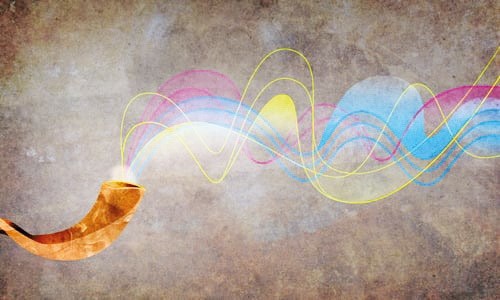
Staples is trying to undo a classic American phrase. All over the radio and internet, Staples keeps telling us as they peddle folders, pens and notebooks, “Let’s Go Forward 2 School. We’re not going back.”
From our youngest years of life, the end of summer has always been “back to school”—it’s back-to-school sales, back-to-school banners, and even back-to-school night. While Staples’ campaign rubs me the wrong way, I think the company actually may be on to something.
The sounds of the shofar gives us a clue on how we should look not just at Back to School, but at all of our fall returns—returning to schedule, returning to the holidays and returning to more of a routine. And yes, each year we go forward … and we also must do it by going back.
As we all know, the shofar has a three part-structure: tekiah, shevarim/teruah, tekiah. It is through those notes that we can learn about the dynamics of our most sacred relationships.
Tekiah: The term “tekiah: is about stability. The root ת.ק.ע means to stake in, to root, to stabilize. The shofar first brings us in by reminding us of our strong and foundational connections in this world—our relationship to God, to others and to our commitments. The tekiah is there to ground us.
Shevarim: If the tekiah is about stability, the shevarim is about the broken moments in life—the unstable chapters that are a part of every relationship. Shevarim is about the crises, the disappointments, the heartbreaks that take place. Shever ( ש.ב.ר.) literally means “shatter.” The shofar, which is meant to awaken us, teaches us that whether it be a dramatic betrayal like the Golden Calf in the Jews’ relationship to God, a miscommunication, a heartbreak, a setback or even a pandemic—there are tearful, shattered moments in all of our connections. Sadly, there will be shevarim in all of our lives.
Teruah: The teruah is actually a loud, dramatic sound. Mentioned numerous times in biblical contexts, it is the dramatic moments that characterize the תרועה. The teruah is those huge events that often change the course of a relationship. Those can be a loud sound of praise to God, a call to action of war, a sound to tell the Jews to move on, a blast of freedom on the Yovel, and even the sound of the shofar on Mt. Sinai—each teruah impacted the nature of connections in the Torah. And in our human relationships—whether it is a relocation, a marriage, a birth or any new dramatic chapter—there are teruah moments that make us feel that our lives will never be the same. The teruah makes us feel that there is only going forward.
Tekiah: And yet, even after the dramatic cacophonous note and sound of teruah, we return. Yes, relationships move forward, but even when their character is different, we go back—we go back to the stability of the tekiah. And whether it be with God, with others or even with those who are no longer in this world, the tekiah brings us back to the covenantal promises of trust and support that are the keys to our relationships.
Whether it is in our religious, professional, family or social connections, all relationships—the tekiahs—are at their best when we integrate the highs and the lows, the shevarims and the teruahs, and then return—return to a new way forward in our foundational tekiah relationships.
Four times each week in our tefilot, we quote the final pasuk from Eicha and we pray for this exact dynamic. We ask God to renew, to go forward and to go back. We say, חדש ימינו כקדם–renew our days as of old! We want to renew and integrate our new realities and embrace our growth, and, at the same time, we want to do so with the strength and foundation of our most trusted and sacred relationships.
As we go back to school, back to “life” and back to the rhythm of the Jewish year, we are “going forward 2 school” and “going forward 2 life,” but, with the message of the shofar, we are doing so grounded in the foundations of what we love about going back. חדש ימינו כקדם
Rabbi Aaron Frank is head of school at Kinneret Day School.










